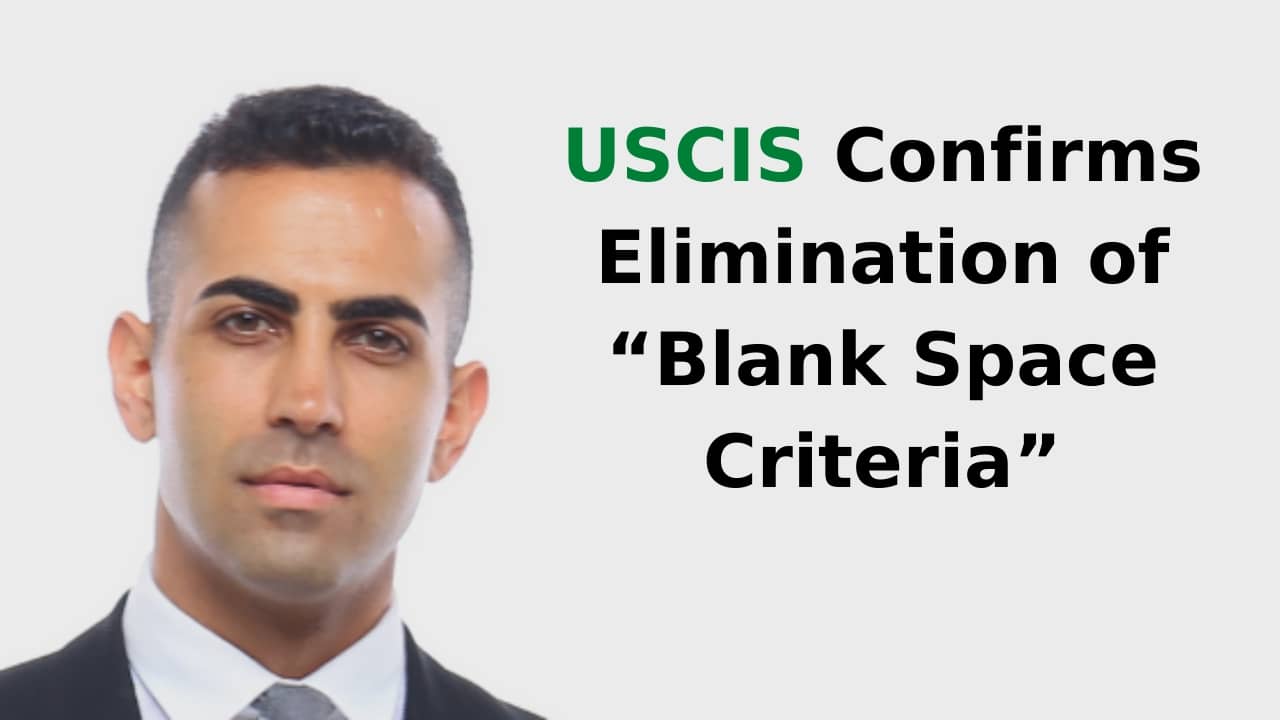USCIS Confirms Elimination of “Blank Space Criteria”
Author: Ashoori Law

@usimmigrationlawyers USCIS Confirms Elimination of “Blank Space Criteria” #immigration #uscis #immigrationlawyer #greencard #greenscreen
♬ original sound – Michael Ashoori, Esq.
During your lifetime, you have probably had to fill out a lot of forms. There are forms when going to the doctor’s office, applying for school, or applying for a loan. We encounter forms for many important and not-so-important tasks in life.
In filling out so many forms, did you ever think about whether you needed to make sure and fill out every single box? What if the information in the box was clearly not applicable to your situation?
Well, in October 2019, the United States Citizenship and Immigration Services (USCIS) decided that it was necessary for applicants to fill out every single space on U.S. immigration forms, even if those spaces were inapplicable to the applicant’s situation, including situations where a green card blank field had no relevant answer. The consequences for not completing every space could be rejection of the application. This came to be known as the “Blank Space Criteria” or “Blank Space Rule.”
In this article, we will discuss the blank space rule and, more importantly, the fact that USCIS changed course, and reversed itself on April 1, 2021.
We are Ashoori Law, led by Michael Ashoori, a U.S. immigration lawyer based in Los Angeles, California. At our law firm we work with clients from all over the world, and we regularly post articles and videos to make sure that you are up to date with the latest immigration news. If, after reading this article, you have more questions, then we invite you to contact us at Ashoori Law. Feel free to call us at +1-818-741-1117 or you may schedule a free consultation by clicking this link.
What is the Blank Space Rule Anyway?
Prior to October 2019, immigration application forms were only rejected if the applicant left required spaces blank, failed to respond to questions related to filing requirements, or omitted any required initial evidence with an application. However, in October 2019, USCIS decided to change the application rejection criteria.
Under this new blank space rule, USCIS began to reject immigration forms if the applicant left any blank spaces on the form. The first three forms for which USCIS implemented the blank space rule were Form I-589, Application for Asylum and for Withholding of Removal; Form I-612, Application for Waiver of the Foreign Residence Requirement; and Form I-918, Petition for U Nonimmigrant Status (victim of criminal activity).
Sadly, the new rule resulted in many applications getting rejected out of hand because spaces were left blank, even if those spaces were clearly inapplicable to the applicant’s situation. USCIS even seemed to become particular about how applicants filled out the spaces that were inapplicable. In some cases, applicants who put the common letters “N/A” in the space to indicate “not applicable,” were also rejected.
Given the massive amount of frustration, delays, and unfairness that resulted from the October 2019 blank space rule, USCIS got sued. The National Immigration Litigation Alliance, Northwest Immigrant Rights Project, and the law firm of Van Der Hout LLP filed a lawsuit in a California District Court, in the case of Vangala v. USCIS. As a result of that lawsuit, USCIS agreed to put its controversial blank space rule on hold in late December 2020.
The Biden Administration Eliminates the New Blank Space Rule Altogether
With the beginning of the Biden Administration came a flurry of changes to U.S. immigration policy. One of those changes related to the blank space rule. Indeed, on April 1, 2021, USCIS announced that it would be reverting back to its application rejection policy that existed prior to October 2019. This means that USCIS will no longer reject Form I-589, Form I-612, or Form I-918 if an applicant leaves a space on the application blank. This is a welcome change for immigration advocates, because the rule unfairly affected many humanitarian applicants.
Remember, though, USCIS may still reject your immigration application (or there may be processing delays) if you:
- Leave a required space blank;
- Fail to respond to questions related to filing requirements; or
- Omit any required initial evidence.
Conclusion
The blank space rule created many problems, particularly for those coming to the U.S. seeking asylum and/or fleeing their home countries because they were victims of criminal activity. The good news is that USCIS has now restored its old processes with regard to blank spaces on application forms.
My name is Michael Ashoori and I’m a U.S. immigration lawyer and the founder of Ashoori Law. As an immigration lawyer, I help families, professionals, investors, and entrepreneurs get visas, green cards, and citizenship to the United States. If you have any questions, feel free to schedule a free consultation by clicking this link.


Michael Ashoori, Esq.
President of Ashoori Law
I’m a U.S. immigration lawyer and I help families, professionals, investors, and entrepreneurs get visas, green cards, and citizenship to the United States.
Since starting my law firm, I’ve helped thousands of people from all over the world with their immigration needs. I’m very passionate, hard-working, and committed to my clients.
Got a question? Send me an email.
